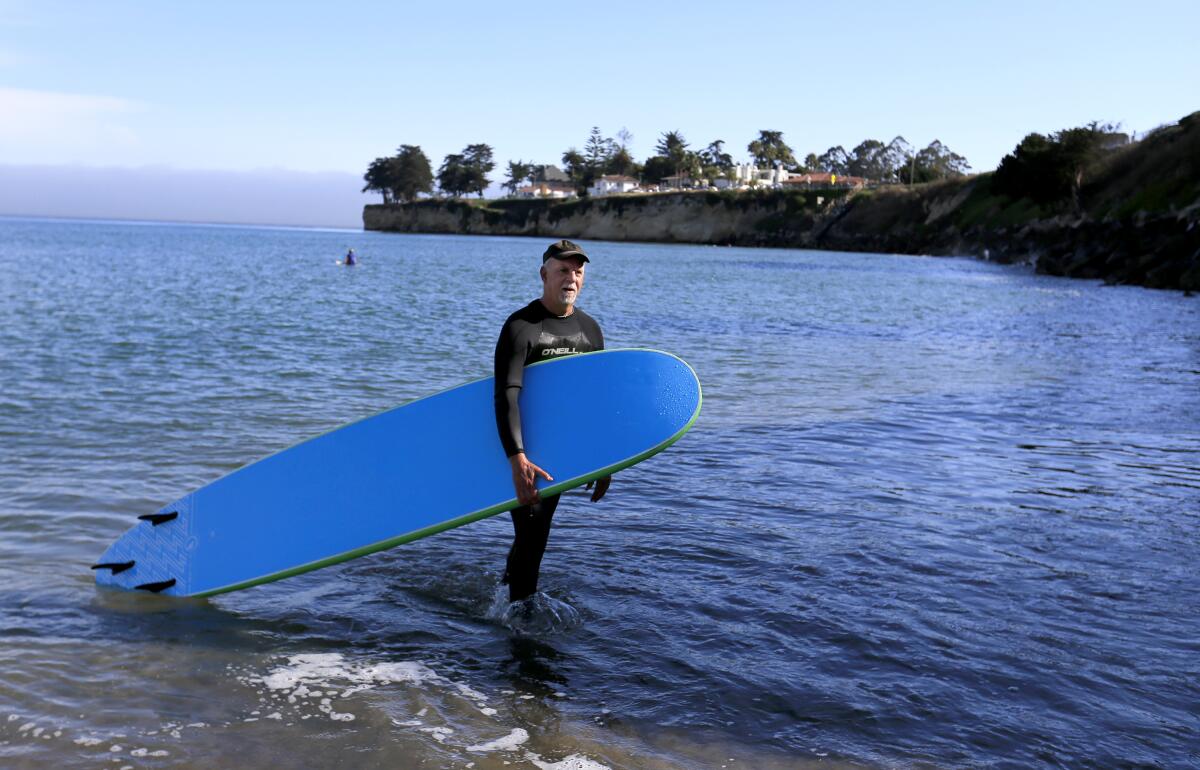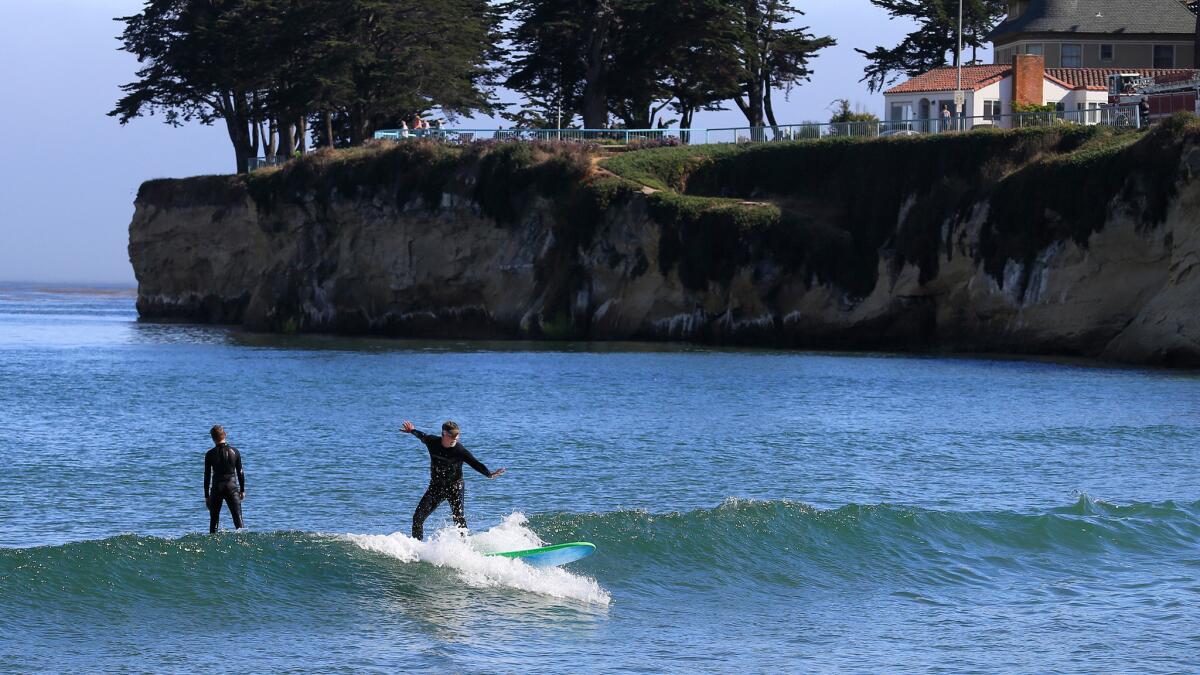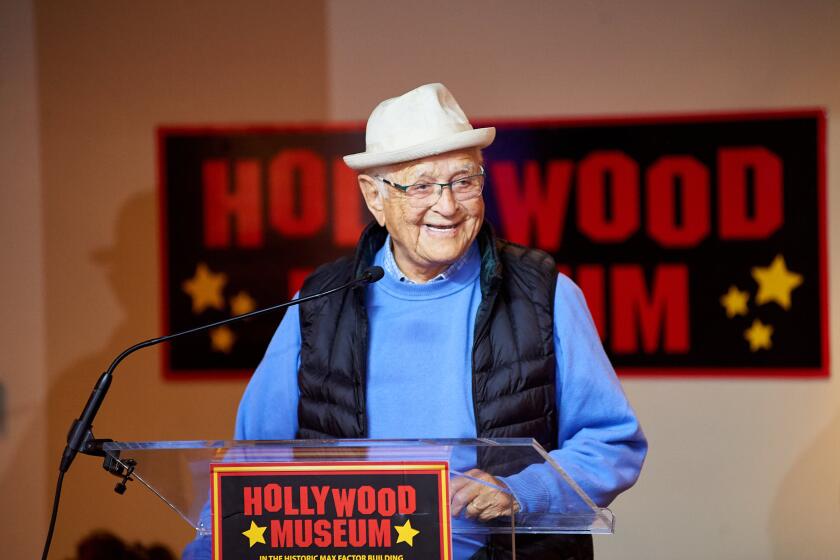Column: Is our aging population a time bomb? An opportunity?

A vaguely familiar chap keeps showing up at my house every morning and evening, seven days a week, without fail.
I look in the mirror and see a cross between my father and myself.
California is about to be hit by an aging population wave, and Steve Lopez is riding it. His column focuses on the blessings and burdens of advancing age — and how some folks are challenging the stigma associated with older adults.
A part of me is unsettled by the slow and steady aging process, which creeps in uninvited and, if you’re lucky, hangs around a while. But another part of me is defiant. I don’t feel as old as the man in the mirror, and I’m leaning on the George Burns line that you can’t help getting older, but you don’t have to get old.
Getting older, by the way, is an epidemic. About 10,000 people turn 65 each day in the United States, and by 2035, people 65 and older will outnumber those under 18 for the first time. In California, a quarter of the population will be 60 or older by 2031.
These trends will challenge and transform us in ways we’ve barely begun to prepare for. Housing, healthcare, the economy, the workforce and the design of cities, homes and transportation will all be impacted. Millennials and older people, who don’t usually end up at the same parties, could become increasingly dependent on each other.

After climate change, “population aging is the second most important phenomenon that humanity will have to figure out a way to address in the 21st century,” said Paul Irving, founding chairman of the Milken Institute’s Center for the Future of Aging. This is true throughout much of the world, he added, with birthrates dropping as the population of older people rises.
But this presents opportunities as well as challenges.
Laura Trejo, director of L.A. County’s Aging and Disabilities Department, thinks about the ways in which older people can mentor younger people, and vice versa. She talks about addressing the problems of financial and housing insecurity, and isolation, by creating an inventory of homeowners who live alone and pairing them with roomies young and old.
“I feel like I’m an imagineer,” says Trejo, who cared for her ailing father before his death, and lives with her 85-year-old mother. “I get to imagine a better future for every older person and their families.… What kind of community do I want to age in? I think about this all the time … and that’s how we should be doing the work we do.”
Get the latest in the Steve Lopez series "Golden State."
Join columnist Steve Lopez as he explores the challenges - and occasional thrills - of aging in California.
You may occasionally receive promotional content from the Los Angeles Times.
In L.A. County and beyond, as the population ages, tens of thousands of people will find that growing old is unaffordable. Many will live in poverty and become homeless. And just as low-income people and minorities were hit hardest by the coronavirus, the same inequities will hammer the aging population.
Fernando Torres-Gil, director of UCLA’s Center for Policy Research on Aging, said that for many adults, the two big questions are “can I afford to cover my bills as I get older, and who will take care of me as I get older?”
Those questions and others are the focus of California’s 10-year Master Plan for Aging, which launched in 2021 with ambitious goals. Torres-Gil is one of the monitors tracking Gov. Gavin Newsom’s promise to “advance solutions for not just older Californians, but for all of us who love and care for them.”
At the moment, the state projects a potentially catastrophic care-provider shortage, in the near future, of more than 3 million people. Finding and training more help is one monumental task; paying them enough to survive, in an industry with notoriously low wages and high numbers of women and minorities, is another.
I found myself immersed in such issues while writing about the last stages of my parents’ lives, when both were in hospice care. About 10 years ago, my father fell trying to walk to the bathroom in the middle of the night and couldn’t get up.
When death is certain, but dignity is not
My dad refused another trip to the hospital, so my mother got down next to him, pulled up a blanket, and they went to sleep together on the floor until help arrived in the morning. I was struck by the cruel irony that at the time in life when you’re least able to fight, you have to be at your strongest.
Long before you reach that stage, aging forces you to make concessions, to adapt, to reinvent yourself. I spent a year on a book project, researching the transition from work to retirement, and in the end, I decided I wasn’t quite ready to walk away.
I am, however — speaking of reinvention — ready to make an announcement.
I’m turning 70 this year, and as of today, my column will focus on aging.
The blessings and burdens.
The challenges and advantages.
The hopes and fears of the blessed and the lonely, the vital and the frail.
I’m calling it Golden State.
Time to retire? Absolutely, said some. Never, said others. After a year of research, I had my answer
I love work, but fear never having time for other things. Riding the boomer wave in search of the perfect sunset
Finally, after nearly 50 years as a journalist, I’ve got a topic I know something about firsthand.
But I need your help.
Tell me how you’re doing.
Are you thriving or struggling?
When you glimpse your own reflection, do you see someone celebrating life or fearing death?
Was David Bowie right when he said that as you age, you become the person you always should have been?
I’d like to hear from those who can’t find work because of age discrimination, those who can’t afford to stop working, those who have struggled in retirement and those who have thrived.
If you’re a student of medicine, social work, urban planning or technology, what role do you see for yourself in confronting the challenges my peers are facing today and all of you will face tomorrow?
I want to hear from caregivers, too, and I’d like to go find, and thank, the wonderful hospice nurse who comforted my mother in her last days of life.
I’d like to hear from the so-called sandwich generation — the people caring simultaneously for parents and children. I want to know what can be learned about the past, present and future when you stand at the very center of three generations. And I’d like to hear from millennials who are locked out of the housing market and can’t wait for some of us to shrivel up and die.
I intend to have some fun with this new beat, too. A reader named Jose Bautista saw me talking about semiretirement on television, with two guitars behind me, and he extended a tempting offer.
“You mentioned something about starting a garage band. I would be interested,” said Bautista, 71. “I meet every two weeks with 83-year-old Alec, who has a good voice. So far we know one song, ‘My Way,’ by Frank Sinatra. Our objective is to possibly perform at [his] and his wife’s retirement center by next Christmas.”
Stay tuned. There could be video.
Also, please send me your picks for best early-bird meals in Greater Los Angeles, so I can play restaurant critic.
On that note, I should say that although I think an early-bird column can be done in good taste (no pun intended), ageism is real. It’s fueled in part by stereotypes and by the profiteers selling the illusion of eternal youth.
In my many years of covering mental health, one of my favorite sources was Stella March, a stigma buster on a mission to call out stereotypes that created fears, misunderstandings and outright discrimination. I hope to follow in her footsteps, and I hereby deputize readers to become ageism stigma busters.
You might have noticed, by the way, that I have not used the words “senior,” “elderly” or “boomer.” I just don’t care much for the “B” word. And as for the other two, for many who work in the field of aging, those terms are considered outdated, and the preferred language is “older” or “aging” adults.
I’m not wild about either of those, or the use of “mature” adults, a term that overlooks a sizable percentage of the population, in my experience. I’ll keep working on this, and if you’ve got ideas, send them my way.
In her new book, “Breaking the Age Code: How Your Beliefs About Aging Determine How Long and Well You Live,” Becca Levy makes a mind-body argument that cognitive and physical decline are accelerated in those who buy into negative views about aging.
The Yale professor says she has improved people’s memory performance and gait, balance and speed “by activating positive age stereotypes” in her lab at Yale. I invited myself to give it a try, and Levy gave me the OK, so I’ll let you know how that goes.
The term “silver tsunami” is often used as a warning, Levy says in her book, but she sees it differently.
“The fact that so many people are getting to experience old age, and doing so in better health, is one of society’s greatest achievements,” she wrote. “It’s also an extraordinary opportunity to rethink what it means to grow old.”
I’m working on that. And to repeat the offer, I’d like to hear from those who glimpse their evolving selves in the mirror and might let me walk through time with them.
More to Read
Get the latest in the Steve Lopez series "Golden State."
Join columnist Steve Lopez as he explores the challenges - and occasional thrills - of aging in California.
You may occasionally receive promotional content from the Los Angeles Times.












